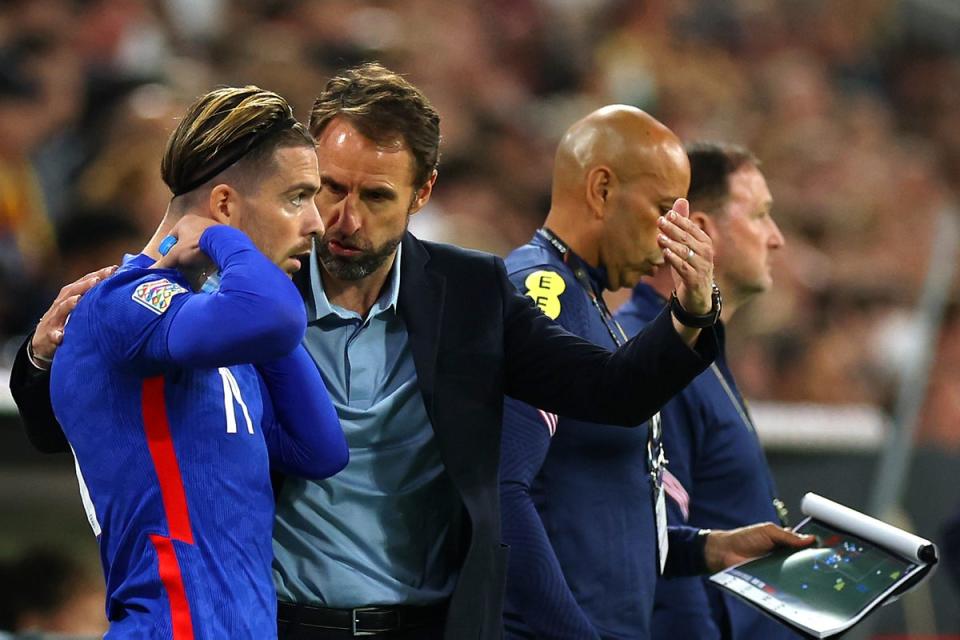Jack Grealish: Why Man City star might be best utilised as England’s World Cup knockout ‘super sub’

There will have been members of England squads past spitting out their coffee to hear Jack Grealish effusing this week about the freedom he feels when trotting onto the pitch to represent his country.
For many generations, and the ‘golden’ one in particular, nothing weighed heavier than pulling on a Three Lions shirt, yet Grealish, even among a squad who appear wired differently, seems a special, carefree case.
“I feel at times I’ve played a bit safe at Manchester City,” he said following Tuesday night’s 1-1 draw in Germany. “I do feel like I play with a lot more freedom here.”
How anyone could be so emboldened by a jersey that has inhibited so many, yet feel constrained in a team that finds itself 3-0 up inside half an hour every other week is a touch perplexing, but herein lies the Grealish paradox.
For England, against the best sides, he has largely been used as a creator of chaos, a disrupter-in-chief called upon to shift the mood of a match late on, most obviously in his two substitute cameos against Germany, at Wembley in the last-16 of Euro 2020 and at the Allianz Arena this week. It goes without saying, however, that disruption and chaos are not part of the Pep Guardiola masterplan (see Santiago Bernabeu, May 4, 2022).
“Pep’s a lot more structured,” Grealish said on Wednesday, comparing his club and national team bosses. Structure at City should not be confused with England’s tendency towards conservatism under Southgate but both managers appear to be on the same page about where Grealish might want to improve to become a permanent fixture in their setups.

Guardiola has cited “tactical” reasons when quizzed on Grealish’s relative lack of minutes or his omissions from some of City’s biggest games, while Southgate laid out his rationale more explicitly over why the former Aston Villa man did not start in Germany.
“At the start of the game the challenge for the wide players was to attack, defend and to try and score goals - high tactical level and you’ve got to be spot on,” Southgate said. “That’s an area Jack can get better at.”
Where they differ, however, is in whether they need him to. For all City’s riches, Guardiola did not spend £100million on an impact substitute and the hope at the Etihad is that Grealish will follow the likes of Riyad Mahrez, Bernardo Silva and Leroy Sane in coming alive in his second season after a year of indoctrination into the cult of Pep.
Southgate, on the other hand, is spoilt for choice with wide attackers he did not pay a bean for, and as he tinkers and tweaks with formation and selection in a bid to find out who to accommodate and how, it must be comforting to know that in Grealish he appears to have a player not reliant on system, nor starting, to stamp his mark all over a game.
In tournament football, the ability to change the momentum of knockout games that are, by their very nature, usually tight affairs between evenly matched teams, is priceless. The failure to use his bench to do so was one of the great criticisms of Southgate after the missed opportunity of the semi-final exit against Croatia at the last World Cup.
Throw in the fact that four of England’s seven major tournament knockout matches under Southgate have gone to extra-time, and the Grealish-as-game-changer option is certainly not one to be passed up lightly.
The increase in noise level any time Southgate elected to use it at the Euros spoke of a populist yearning for Grealish, proclaimed king of the free men, that was perhaps out of kilter with the merit of his few international showings.
His British record transfer to the City behemoth and an underwhelming first campaign (when he was outshone, for instance, by England rival Phil Foden) dampened some of the clamour, but his recent open top bus antics and Ibiza jolly served as reminders of the forward’s everyman appeal, reawakening the movement even before the injection of energy against the Germans that has likely earned him a start when Italy visit Molineux tomorrow.
For all the case has been laid out for Grealish’s best use being as an Eddie Jones-style finisher, there remains a starting berth up for grabs in England’s attack alongside Raheem Sterling and Harry Kane.
Southgate has appeared keenest on Mason Mount and Foden, but there is a sense that neither they, nor any of those queuing up behind, have quite cracked international football yet and there is a shirt there for the taking for whoever manages it first, as Bukayo Saka showed last summer in going from outsider of the bunch to incumbent in pretty much the space of a week.
There is little doubt that Grealish has the ability to make it his own, particularly if the positive symptoms of second City season are on display by the time England head to Qatar in November. But even then, he may just be a card best played late.
